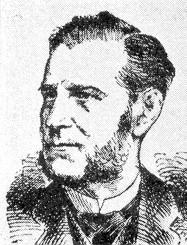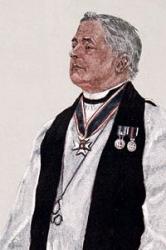1759 - 1829 Person Name: Wm. Shrubsole, Jr. Hymnal Number: 337 Author of "Zion, Awake, Thy Strength Renew" in Church Hymnal, Mennonite William Shrubsole was born in Sheerness, Kent, in 1759. His first occupation was as a shipwright in Sheerness Dockyard, but he was promoted, and afterwards removed to London, where he at length held the position of Secretary to the Committee of the Treasury in the Bank of England. He died at Highbury, in 1829. Mr. Shrubsole was the author of several hymns, and some articles in the religious magazines of his day.
--Annotations of the Hymnal, Charles Hutchins, M.A. 1872.
=============================
Shrubsole, William, eldest son of William Shrubsole, a master mastmaker in the dockyard at Sheerness, Kent, and a Lay Preacher, was born at Sheerness, Nov. 21, 1759. In his earlier years he was engaged as a shipwright in the dockyard, and then as a clerk. In 1765 he removed to London, and entered the Bank of England as a clerk. He subsequently became the Secretary to the Committee of the Treasury. He died at Highbury, Aug. 23, 1829. Mr. Shrubsole was for some time a communicant at St. Anne's, Blackfriars, during the incumbency of the Rev. W.Goode; but during the last twenty years of his life he was a member with the Congregationalists, and attended the Hoxton Academy Chapel. He interested himself in religious societies, and especially the London Missionary Society (of which he became a director and one of the secretaries), the Bible Society, and the Religious Tract Society. He contributed hymns to the Evangelical Magazine, the Christian Magazine, the Theological Miscellany, the Christian Observer and the Youths' Magazine, at various dates, from 1775 to 1813. To these works we have traced nearly twenty of his hymns. A Memoir of Shrubsole was contributed by his daughter to Dr. Morison's Fathers and Founders of the London Missionary Society, 2 vols., London, Fisher, Sons & Co., 1844. Seven of his hymns are also given, together with a portrait, in the same work. His hymns in common use include:—
1. Arm of the Lord, awake, awake. Put on Thy strength, the nations shake. Missions. This appeared in Missionary Hymns, 1795; and in Morison's Fathers and Founders, &c, 1844, vol. i. p. 451, in 6 stanzas of 4 lines. Dr. Rogers in his Lyra Britannica, 1867, attributes this hymn to Shrubsole's father, and dates it 1780. Against this statement we can only put the fact that it is claimed in Morison for the son. Original text, Lyra Britanica, 1867, p. 502.
2. Bright as the sun's meridian blaze . Missions. Written Aug. 10, 1795, for the first meeting of the London Missionary Society. It was printed in the Evangelical Magazine, Sept., 1795, headed “On the intended Mission," and signed "Junior." It is also in Morison, 1844, i. p. 449, together with the note that the hymn "was duly acknowledged by Mr. Shrubsole in his lifetime, and the original manuscript, with numerous corrections, is in possession of his family, in his own autograph," and that it bears date "August 10, 1795." Original text Lyra Britanica, 1867, p. 504.
3. In all the paths my feet pursue. Looking unto Jesus. Appeared in the Evangelical Magazine, 1794; in Morison, i., 1844, p. 454; and Lyra Britanica, 1867, p. 503.
4. Shall science distant lands explore? Missions. Published in the Evangelical Magazine, 1795; and again in Morison, 1844, i. p. 452.
5. When streaming from the Eastern skies . Daily Duties; or, Morning. Published in the Christian Observer, Aug., 1813, in 8 stanzas of 8 lines, headed "Daily Duties, Dependence and Enjoyment," and signed Probus. Also in Morison, 1844, i. p. 453; and Lyra Brittanica, 1867, p. 505. The well-known cento, "As every day Thy mercy spares," is from this hymn, and begins with st. iii.
6. Ye saints, your grateful praises bring
W. Shrubsole


 My Starred Hymns
My Starred Hymns





